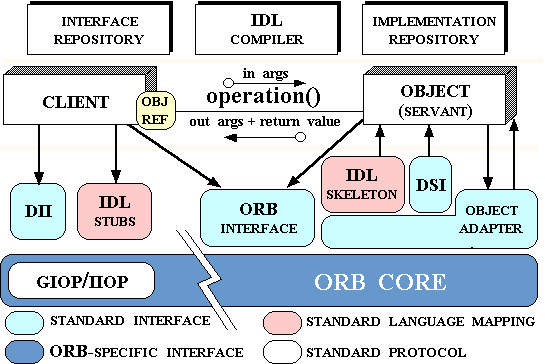People seems agree with the concept that distributed components should base on objects. There are technologies from various communities and companies, includes:
- COM/DCOM from Microsoft.
- CORBA from OMG.
- JavaRMI from Sun.
- JINI from Sun.
This has its historical reason since at the time that CORBA was defined (early 1990s), QoS is hardly a critical issue in general network applications, and few people had thought that CORBA would be used in embedded systems. The CORBA specification largely leaves the QoS issues to individual implementations. TAO as one of the pioneers of real-time CORBA, provides one solution to add QoS specification and real-time scheduling features to CORBA. We will look at it more carefully next week. Today, there is a real-time community in OMG. As Xiaojun pointed out, it is still in progress.
There are some possible solutions to our problem -- use the flexibility of CORBA in real-time control systems, with sufficient QoS guarantee --
- Use/reconfigure TAO
- Use a proper commercial ORB product and improve it.
- Build "SEC ORB"
We pulled out presentation slides from Georgia Tech (May 19-20, 1999) to see what systems we may deal with.
I think it is necessary to put the CORBA architecture diagram here.

Figure from http://www.cs.wustl.edu/~schmidt/corba-overview.html
Tom raised this question (or something similar?). CORBA says nothing about the logical correctness of an application. Eventually, we will need some concurrency models built atop CORBA, for example, event channels or CPS. On that level, verification is certainly an issue.
We didn't have enough time to go to the detail of this. I think the links above by Ben are excellent. And we realized that the performance study on the-Internet-based applications might not be the same as the performance study that we want.
We didn't have enough time to talk about this either. John mentioned Orbix from IONA, which support some real-time operating systems, like QNX.
We have a somewhat extended example than the HelloWorld given in Java Tutorial. But we follow the basic development step described there:
- Writing the IDL Interface
- Declaring the CORBA IDL Module
- Declaring the Interfaces and Exceptions
- Declaring the Operations
- Compiling the IDL Interface
idltojava -fno-cpp SimpleHelloWorld.javawhere -fno-cpp simply indicates that there is no c++ preprocessor.
Compile the IDL code will generate the source code for your programming language, say Java. Java's idltojava compiler generates a subdirectory with the name of your IDL module (in our case, SimpleHelloWorld).
Although you may do this step later, I usually do it before I write any client or server codes. The reason is that I would know which class to extend.
Usually you don't have to know what's inside the generated files other than know which is which. Here is a list of the files:
On the server side:
- _GoodDayImplBase.java. The skeleton. The servant code extends it.
On the client side:
- GoodDay.java. The Java inferface for the GoodDay interface defined in the IDL.
- GoodDayHelper.java.This final class provides auxiliary functionality, notably the narrow() method required to cast CORBA object references to their proper types.
- GoodDayHolder.java.This final class holds a public instance member of type GoodDay. It provides operations for out and inout arguments, which CORBA has but which do not map easily to Java's semantics. It does so in case some (other) code has SimpleHelloWorld as its out arguments.
- _GoodDayStub.java. This is the stub code that the client may call. It implements the GoodDay.java interface.
- The exceptions are generated so that the client side can use it easily.
- Developing the Servant
Servant is a concrete class that implement the IDL interface. You can think of it as the "server" in the client-server concept, but server is usually something else in CORBA. Our servant code ExampleGoodDayImpl.java is here. Notice that there is nothing about "network programming" in this code, other than that you should know which class the ExampleGoodDayImpl should extend. - Developing the Server
- Creating an ORB Object
- Instantiating the Servant Object
- Obtaining the Initial Naming Context
- Narrowing the Object Reference
- Registering the Servant with the Name Server
- Waiting for Invocation
- Developing a Client Application
- Creating an ORB Object
- Finding the SimpleHelloWorldServer by looking up the name
- Invoking the Remote Operation
- Compiling the package
javac *.java - Executing
- Start JDK transient name server with a proper port, say on machine "foo"
tnameserv -ORBInitialPort 1050 - Start the server, give the host and port of the name server.
java SimpleHelloWorldServer -ORBInitialHost foo -ORBInitialPort 1050 - Start the client, give the host and port of the name server.
java SimpleHelloWorldClient -ORBInitialHost foo -ORBInitialPort 1050
- Start JDK transient name server with a proper port, say on machine "foo"